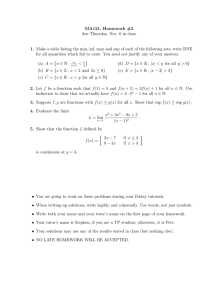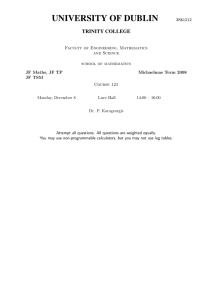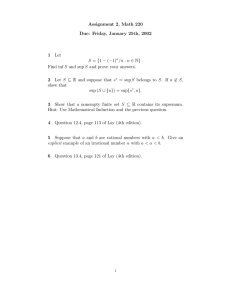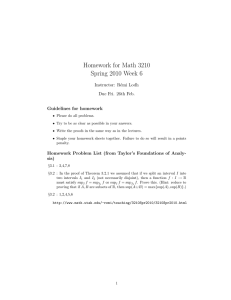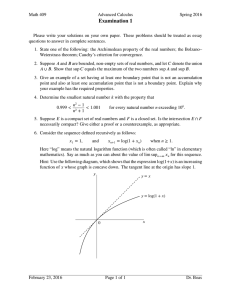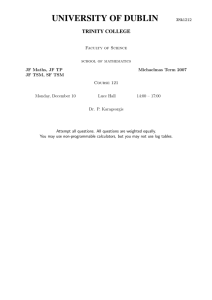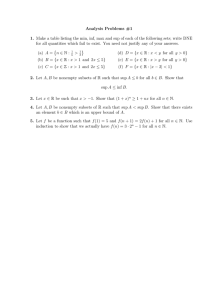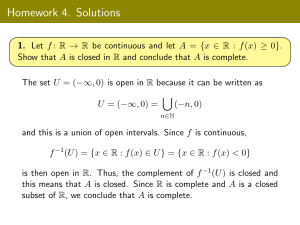Lecture 25 Martingale-difference inequalities. 18.465 Let Z(x
advertisement
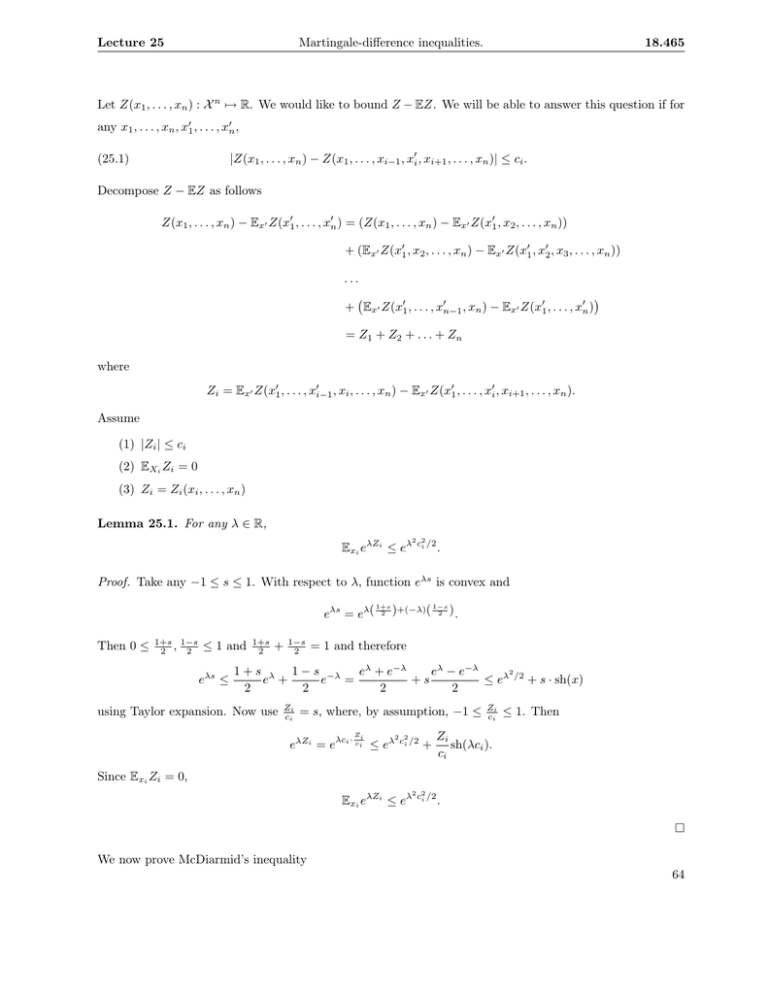
Lecture 25 Martingale-difference inequalities. 18.465 Let Z(x1 , . . . , xn ) : X n �→ R. We would like to bound Z − EZ. We will be able to answer this question if for any x1 , . . . , xn , x�1 , . . . , x�n , |Z(x1 , . . . , xn ) − Z(x1 , . . . , xi−1 , x�i , xi+1 , . . . , xn )| ≤ ci . (25.1) Decompose Z − EZ as follows Z(x1 , . . . , xn ) − Ex� Z(x�1 , . . . , x�n ) = (Z(x1 , . . . , xn ) − Ex� Z(x�1 , x2 , . . . , xn )) + (Ex� Z(x�1 , x2 , . . . , xn ) − Ex� Z(x�1 , x�2 , x3 , . . . , xn )) ... � � + Ex� Z(x�1 , . . . , x�n−1 , xn ) − Ex� Z(x�1 , . . . , x�n ) = Z1 + Z2 + . . . + Zn where Zi = Ex� Z(x�1 , . . . , x�i−1 , xi , . . . , xn ) − Ex� Z(x�1 , . . . , x�i , xi+1 , . . . , xn ). Assume (1) |Zi | ≤ ci (2) EXi Zi = 0 (3) Zi = Zi (xi , . . . , xn ) Lemma 25.1. For any λ ∈ R, 2 2 ci /2 Exi eλZi ≤ eλ . Proof. Take any −1 ≤ s ≤ 1. With respect to λ, function eλs is convex and eλs = eλ( Then 0 ≤ 1+s 1−s 2 , 2 ≤ 1 and eλs ≤ 1+s 2 + 1−s 2 1+s 2 )+(−λ)( 1−s 2 ) . = 1 and therefore 2 1 + s λ 1 − s −λ eλ + e−λ eλ − e−λ e + e = +s ≤ eλ /2 + s · sh(x) 2 2 2 2 using Taylor expansion. Now use Zi ci = s, where, by assumption, −1 ≤ Z λci · c i eλZi = e i 2 2 ci /2 ≤ eλ + Zi ci ≤ 1. Then Zi sh(λci ). ci Since Exi Zi = 0, 2 2 ci /2 Exi eλZi ≤ eλ . � We now prove McDiarmid’s inequality 64 Lecture 25 Martingale-difference inequalities. 18.465 Theorem 25.1. If condition (25.1) is satisfied, − P (Z − EZ > t) ≤ e 2 t2 Pn c2 i=1 i . Proof. For any λ > 0 � � Eeλ(Z−EZ) P (Z − EZ > t) = P eλ(Z−EZ) > eλt ≤ . eλt Furthermore, Eeλ(Z−EZ) = Eeλ(Z1 +...+Zn ) = EEx1 eλ(Z1 +...+Zn ) � � = E eλ(Z2 +...+Zn ) Ex1 eλZ1 � � 2 2 ≤ E eλ(Z2 +...+Zn ) eλ c1 /2 � � 2 2 = eλ c1 /2 EEx2 eλ(Z2 +...+Zn ) � � 2 2 = eλ c1 /2 E eλ(Z3 +...+Zn ) Ex2 eλZ2 2 (c21 +c22 )/2 2 Pn ≤ eλ ≤ eλ i=1 Eeλ(Z3 +...+Zn ) c2i /2 Hence, 2 P (Z − EZ > t) ≤ e−λt+λ Pn i=1 ci2 /2 and we minimize over λ > 0 to get the result of the theorem. � Example 25.1. Let F be a class of functions: X �→ [a, b]. Define the empirical process � � n � � 1� � � f (xi )� . Z(x1 , . . . , xn ) = sup �Ef − � n f ∈F � i=1 Then, for any i, |Z(x1 , . . . , x�i , . . . , xn ) − Z(x1 , . . . , xi , . . . , xn )| � � � � � � 1 � = �sup ��Ef − (f (x1 ) + . . . + f (x�i ) + . . . + f (xn ))�� � f n � ��� � �� 1 − sup ��Ef − (f (x1 ) + . . . + f (xi ) + . . . + f (xn ))��� � n f ≤ sup f ∈F 1 b−a |f (xi ) − f (x�i )| ≤ = ci n n because sup f (t) − sup g(t) ≤ sup(f (t) − g(t)) t t t 65 Lecture 25 Martingale-difference inequalities. 18.465 and |c| − |d| ≤ |c − d|. Thus, if a ≤ f (x) ≤ b for all f and x, then, setting ci = � b−a n for all i, � t2 P (Z − EZ > t) ≤ exp − �n (b−a)2 2 i=1 n2 By setting t = � 2u n (b 2 nt − 2(b−a) 2 =e . − a), we get � � P Z − EZ > � 2u (b − a) ≤ e−u . n Let ε1 , . . . , εn be i.i.d. such that P (ε = ±1) = 12 . Define � n � � �1 � � � εi f (xi )� . Z((ε1 , x1 ), . . . , (εn , xn )) = sup � � � n f ∈F i=1 Then, for any i, |Z((ε1 , x1 ), . . . , (ε�i , x�i ), . . . , (εn , xn )) − Z((ε1 , x1 ), . . . , (εi , xi ), . . . , (εn , xn ))| � � �1 � � 2M � � ≤ sup � (εi f (xi ) − εi f (xi ))�� ≤ = ci n f ∈F n where −M ≤ f (x) ≤ M for all f and x. Hence, � P (Z − EZ > t) ≤ exp − �n 2 i=1 By setting t = � 8u n M, � t2 (2M )2 n2 nt2 = e− 8M 2 . we get � � P Z − EZ > 8u M n � 8u M n � ≤ e−u . Similarly, � P EZ − Z > � ≤ e−u . 66
